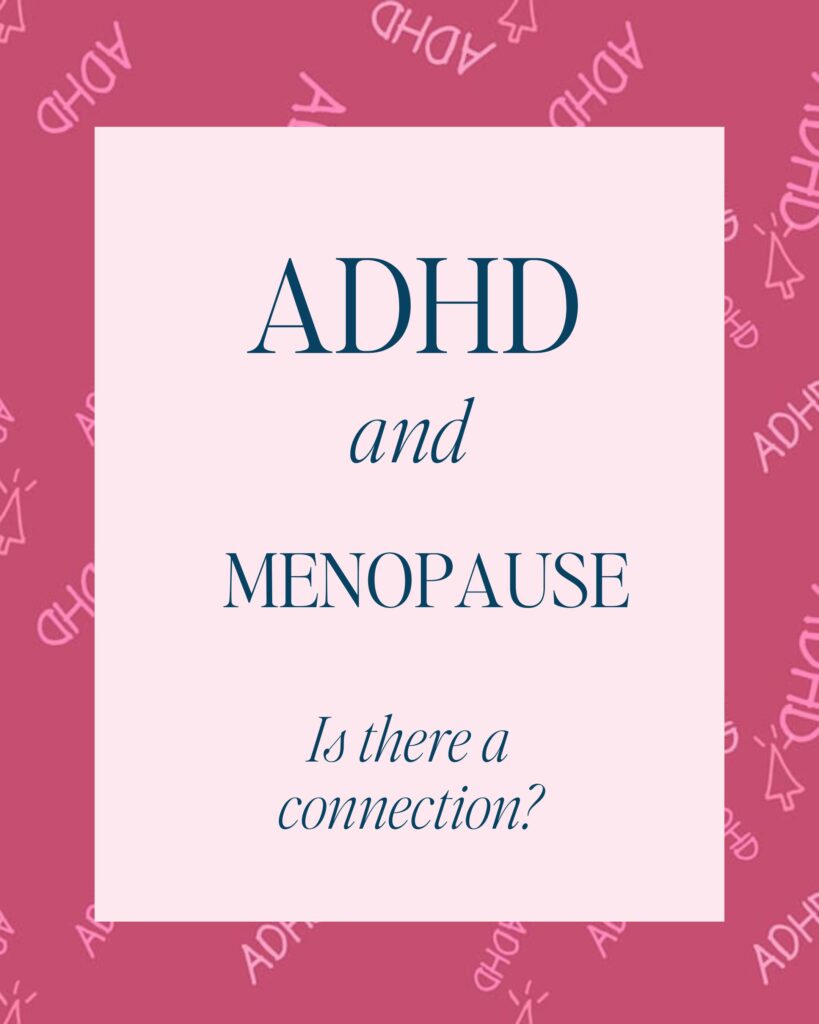ADHD and it’s connection with the menopause transition has often come up in our consultations recently. In the past, ADHD was often thought of as a condition that affected boys and men. But in recent years there has been more understanding about the differences in symptoms and presentation between genders, and it is very possible that hormones play a part in this. More women are being diagnosed with ADHD than ever before, and often midlife is when the diagnosis is made. Is there a connection?
In general, there can be differences in the way men and women demonstrate or experience ADHD. Compared with males, females can tend to have less hyperactivity and impulsive behaviour, and more attention deficit, anxiety and depression, with lower self esteem.
The ADHD brain tends to be lower in dopamine, and dopamine levels can drop further over the perimenopausal transition. Fluctuating hormone levels over this time may worsen ADHD symptoms and it can be difficult to untangle the mix of perimenopausal brain fog and worsening ADHD. We also know that the perimenopausal brain can be vulnerable to low mood and anxiety. Hormone therapy can help over this time to stabilise the perimenopausal brain changes and symptoms, and seeing a specialist for specific ADHD management is also important. But there are also lifestyle self-management strategies that can be helpful, even if you haven’t been formally diagnosed with ADHD.
Below, our colleague Dr Karl Jansen, who is a psychiatrist and an expert in adult ADHD shares some helpful resources and insights from his experience in this area:
There isn’t a pill that can make you to do your taxes instead of binge watching TV…
…but self management strategies can be helpful.
It’s not necessary to have a diagnosis of ADHD to benefit from ADHD resources and/or an ADHD coach, and there are many helpful books available on attention deficit. Many of these books can be ordered online, for example, at Fishpond.com or can be found in the library system. There are also numerous free videos on YouTube, and many audio books on attention deficit at www.audible.co.au.
For procrastination, Eat That Frog! by Bryan Tracy is a very short book which contains key advice in this area. For non-readers, this is also available as an audible book. More in-depth resources include:
Get It Done by Aylet Fishbach
Getting Things Done and The Getting Things Done Workbook by David Allen
How to Get Things Done without trying too hard by Richard Templar
There are many accessible books on improving short term, working memory, some of which are also available as audible books. I recommend The Memory Book by Harry Lorayne and Jerry Lucas, Unlimited Memory by Grandmaster Kevin Horsley, How to Develop a Brilliant Memory – Week by Week by Dominic O’Brien, Memory Craft by Lynne Kelly, Keep Sharp by Sanjay Gupta, You Can Have an Amazing Memory by Dominic O’Brien, The Complete Guide to Memory by Richard Restak and Memory Rescue by Daniel G Amen.
An ADHD coach can be helpful regardless of diagnosis: Some ADHD coaches include:
ADHD coaches linked with Beehyve Health
Mikala Boon in Christchurch, ADHD Unlimited
Jacqui Ede at Wired Consulting
and also Kelly Biltz who is based in California (kelly@teenswithadhd.com).
Dr Karl L. R. Jansen
MB.ChB., M.Med.Sci., D.Phil. (Oxon.), FRCPsych
has over 30 years of experience as a psychiatrist. He assess and treats mostly general adult psychiatry, adult ADHD, mood and anxiety disorders, court reports, post-traumatic stress disorder and addictions including alcohol.
Areas of Specialisation
- Psychiatric Disorders
- Alcohol & Drug Abuse/Addiction
- Anxiety Disorders/Depression
- ADHD
- Chronic Fatigue
- Post-Traumatic Stress Disorder
Find out more about Dr Karl Jansen here:
https://healthpages.co.nz/directory/listing/psychiatry-karl-jansen

Comments +